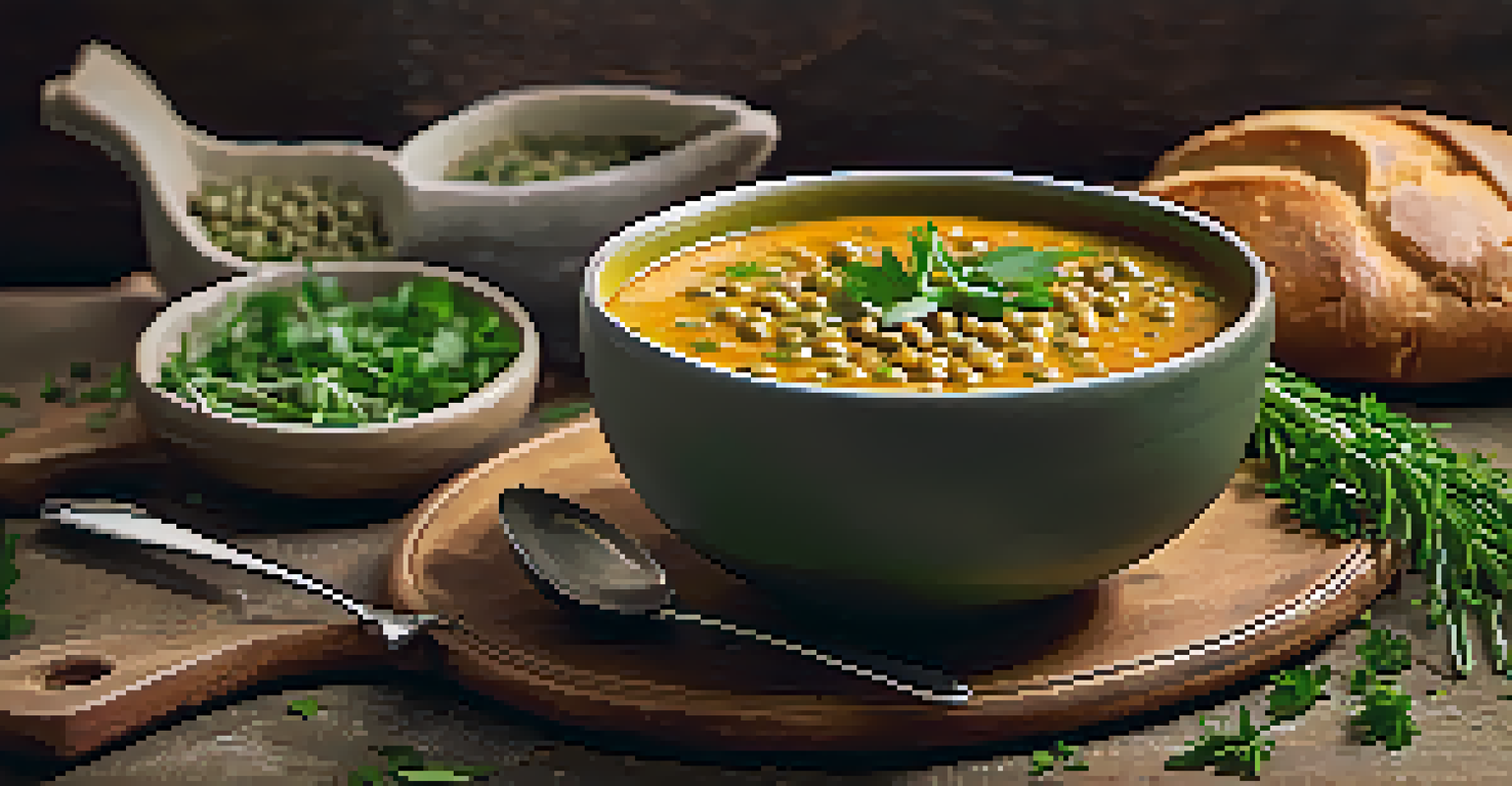Plant-Based Protein Myths: Debunking Common Misconceptions

Myth 1: Plant-Based Proteins Lack Complete Amino Acids
One common misconception is that plant-based proteins don't offer all essential amino acids. This isn’t true, as many plant sources can provide complete proteins, particularly when combined. For example, quinoa and soy are excellent sources that contain all nine essential amino acids required for our health.
Let food be thy medicine and medicine be thy food.
Even if some plant proteins are lower in one or two amino acids, you can easily create a complete protein profile by combining different sources throughout the day. Think of it like a puzzle; each piece contributes to the whole picture! For instance, pairing rice with beans or peanut butter with whole-grain bread can do the trick.
So, while it's important to be mindful of amino acid profiles, the myth that you can't get complete proteins from plants is simply outdated. With a varied and balanced diet, plant-based eaters can absolutely meet their protein needs.
Myth 2: Plant-Based Proteins Are Inferior in Quality
Another misconception is that plant proteins are inferior to animal proteins in terms of quality. However, this isn't a straightforward comparison, as the nutritional needs of individuals differ. While animal proteins may be more concentrated, many plant proteins provide fiber, vitamins, and minerals that contribute to overall health.

For example, legumes like lentils and chickpeas are not just protein-rich; they also offer substantial fiber that supports digestive health. In contrast, animal proteins often lack this important nutrient. So, while the protein content might be lower, the overall health benefits of plant proteins can be significant.
Plant Proteins Can Be Complete
Many plant sources, like quinoa and soy, provide all essential amino acids, making them viable complete protein options.
It's also worth noting that the body can adapt and efficiently utilize plant proteins when consumed regularly. So, don't discount the power of plants just because they might seem different from what you're used to!
Myth 3: You Can't Build Muscle on a Plant-Based Diet
Many people believe that building muscle without animal protein is impossible, but that's far from the truth. Athletes and bodybuilders are increasingly turning to plant-based diets and achieving impressive results. The key lies in consuming enough protein and engaging in regular strength training.
Eating plants is not about deprivation, it’s about abundance.
For instance, famous athletes like Venus Williams and Lewis Hamilton have adopted plant-based diets and continue to perform at the highest levels. Their success demonstrates that with the right approach, muscle building is entirely feasible on a plant-based regimen.
Incorporating diverse sources of plant protein, such as tofu, tempeh, and protein-rich grains, can help meet muscle-building needs. So, if you're committed to a plant-based lifestyle, remember that your goals are still within reach!
Myth 4: Plant Proteins Are Hard to Digest
Another myth is that plant proteins are difficult for our bodies to digest. While some individuals may find certain legumes a bit harder on the stomach, this doesn't apply to all plant proteins. In fact, many people digest plant proteins well, especially when prepared properly, such as soaking beans or cooking grains thoroughly.
Moreover, the presence of fiber in plant proteins can actually aid digestion and promote a healthy gut. Foods like lentils and chickpeas not only provide protein but also enhance digestive health when consumed regularly. Think of fiber as the friendly helper in your digestive system!
Plant Proteins Offer Unique Benefits
Plant proteins, while sometimes lower in concentration, come packed with additional nutrients like fiber, vitamins, and minerals that support overall health.
If digestive issues are a concern, it’s always a good idea to introduce plant-based proteins gradually. This allows your body to adjust and can help you enjoy the benefits without discomfort.
Myth 5: Plant-Based Proteins Are Always Processed
A common misconception is that all plant-based proteins come from overly processed sources. While some protein products, like protein powders or meat substitutes, may be processed, there are plenty of whole food options available. Foods like beans, lentils, nuts, and seeds are all fantastic, minimally processed sources of plant protein.
For instance, a simple bowl of lentil soup or a handful of almonds can provide a nourishing dose of protein without the need for additives or preservatives. Incorporating whole foods into your meals ensures you're getting a rich array of nutrients.
So, don't be fooled into thinking that plant-based proteins are synonymous with processed foods. The beauty of a plant-based diet lies in its diversity, allowing you to enjoy whole, nutritious choices.
Myth 6: You Have to Eat Meat for Sufficient Protein
Some people firmly believe that meat is the only reliable protein source, but this is a limiting view. While animal products are certainly rich in protein, there are numerous plant-based foods that can fulfill protein needs effectively. From quinoa and nuts to leafy greens and legumes, the options are plentiful.
For example, a single cup of cooked quinoa contains about 8 grams of protein, while a serving of chickpeas provides around 15 grams. These foods can easily be integrated into meals and snacks to help meet daily protein requirements without any meat.
Plant-Based Diets Are Accessible
A plant-based diet can be budget-friendly and flexible, allowing individuals of all backgrounds to incorporate nutritious, whole foods easily.
It's essential to expand your thinking about protein sources. Embracing a plant-based approach can not only provide adequate protein but also contribute to a more sustainable and health-conscious diet.
Myth 7: Plant-Based Diets Are Expensive
Many individuals shy away from plant-based diets due to the perception that they are costly. However, this myth doesn’t hold true when you consider the cost of whole foods compared to processed options. Staples like beans, rice, and seasonal vegetables are often more economical than meat and dairy products.
For example, purchasing dried beans in bulk can be incredibly affordable and provides ample protein compared to buying meat. Additionally, meal prepping with these ingredients can help stretch your dollar while reducing food waste.

By focusing on whole, unprocessed foods and shopping smartly, a plant-based diet can be not only healthy but also budget-friendly. So, don’t let the myth of high costs deter you from exploring the benefits of plant-based eating!
Myth 8: Plant-Based Diets Are Not Suitable for Everyone
Lastly, many people think that plant-based diets are only for certain groups, like vegans or health enthusiasts. In reality, anyone can benefit from incorporating more plant-based foods into their diet. Whether you're a meat lover looking to reduce your intake or someone entirely plant-based, there’s room for everyone.
The beauty of a plant-based approach is its flexibility. You can choose to include various amounts of plant foods while still enjoying your favorite animal products. This allows people to find a balance that works for their lifestyle and preferences.
Ultimately, it's about creating a diet that feels right for you. By dispelling the myth that plant-based eating isn't for everyone, we can open doors to healthier, more sustainable choices for all.